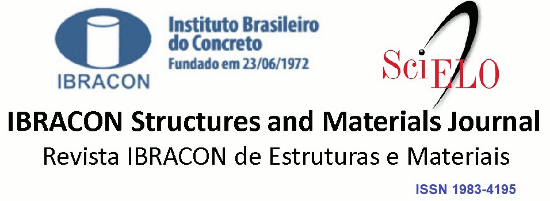ABSTRACT
Currently, there is an awareness that is critical to assess the durability characteristics of concrete with as much attention as the mechanical properties. The durability of concrete structures can often be affected by chemical attacks, jeopardizing its performance and security. When concrete is subjected to high temperature at early ages, many physical and chemical changes in hardened concrete may occur. It iswidely accepted that concrete subjected to these conditions of temperature and exposed to moisture is prone to cracking due to Delayed Ettringite Formation (DEF). This work aims at providing a DEF risk analysis on foundation pile caps at the Metropolitan Region of Recife - PE. Temperature rise measurement was performed in situ at 5 different caps through datalogger and thermocouples equipments. Furthermore, the Duggan test was performed in order to assess the level of expansion of 3 cements studied: X (CP II E 40), Y (CP II F 32) and Z (CP V ARI RS). Simultaneously, the chemical compositions of these cements and their respective clinkers were quantified by analysis of X-ray fluorescence (XRF). The cement X (CP II E 40) showed the chemical characteristics favoring with more intensity DEF and, as a result, higher level of expansion in the test Duggan. It is noteworthy that incorporation of metakaolin (8% and 16%) and silica fume (5% and 10%) showed mitigating potential of expansions. It is important to point out that all factors related to thermal properties and chemical composition of the concrete used in the region converge to a condition of ideal susceptibility for triggering DEF. Therefore, it is essential at least minimum and basic requirements in the design specification in order to avoid high temperatures in the massive concrete elements, preventing them from delayed ettringite formation.
Keywords:
delayed ettringite formation (DEF); chemical composition; temperature; prevention; risk











